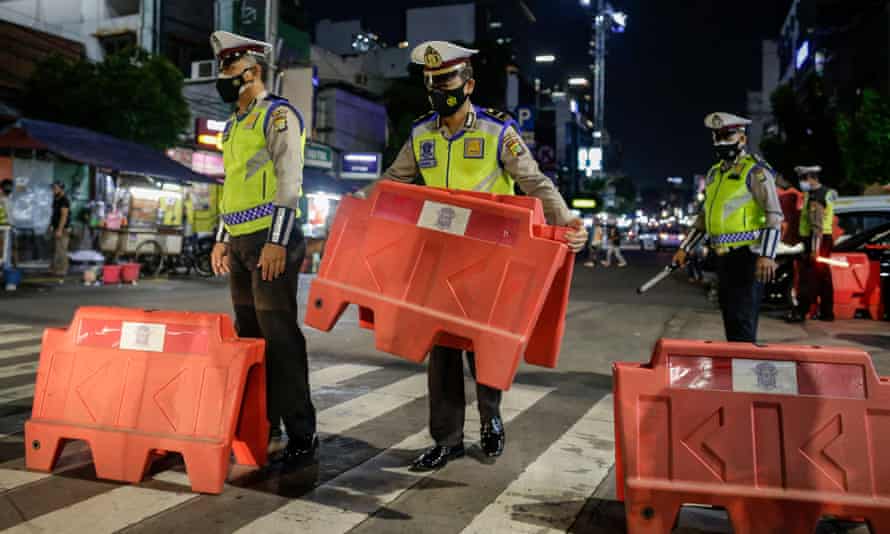
Indonesian health authorities are battling a new surge in coronavirus infections, as the National Agency for Disaster Management (BNPB) reported the highest one-day total, with 14,535 cases confirmed in the 24 hours to Monday.
Daily case totals are reaching levels last seen in January, the peak of Indonesia’s fight against the virus.
The tally brought Indonesia’s total to more than two million, the third highest in Asia after India and Iran. At least 294 people died on Monday, bringing the country’s total confirmed fatalities to more than 54,950. Both the total cases and total deaths are the highest in south-east Asia.
Public health experts say widespread travel during the Muslim Eid al-Fitr holiday period and the circulation of the more transmissible Delta variant are believed to be driving the latest surge.
The increase is putting pressure on hospitals, including in Jakarta, where 80% of hospital beds are full, and has added urgency to the government’s plan to inoculate 1 million people each day by next month. Authorities have so far only fully vaccinated 12.3 million of Indonesia’s 270 million people and partially immunised another 10.9 million.
The World Health Organization last week said Indonesia’s drastic increase in hospital bed occupancy rates was a major concern and necessitated stricter public health and social measures, including large-scale social restrictions.
The government has resisted a large-scale lockdown due to fears of the economic impact. But tighter restrictions will apply for two weeks in 29 “red zones” nationwide where infection rates are high, with religious activities at houses of worship suspended and restaurants and cafes and malls required to operate at 25% capacity, the coordinating economic minister, Airlangga Hartarto, said.
“The situation is worrying,” said Riris Andono Ahmad, an epidemiologist at Gajah Mada University. “We are facing a second wave of Covid-19 with the most transmissible variant and the public’s low compliance with health protocols.” He urged stricter measures.
“All of the government’s efforts and policy to curb Covid-19 transmission will be ineffective if it gives room for people to gather and crowd,” he said.
The national Covid-19 taskforce said a spike in infections has been seen in Jakarta, Banten, West Java, Central Java, Yogyakarta and East Java provinces. All are on Java, the most populous of Indonesia’s more than 17,000 islands.
The country’s case fatality rate also reached 2.7% as of Monday, higher than the global average of 2.2%. East Java, home to Surabaya, has the highest rate in of any country in the province, with 7.3%. Despite the increase in cases, Indonesia hasn’t revised the plan to open Bali for international visitors in July.

In the district of Kudus, where 308 healthcare workers have been infected, bed occupancy rates exceeded 90% last week. The workers were infected despite most of them having received the Sinovac vaccine earlier this year, raising questions over its effectiveness.
But Badai Ismoyo, head of the Kudus health department, said that he believed the vaccine had prevented the workers from severe infection. Just over 5% of the workers vaccinated had later been infected, he told the Jakarta Globe.
Last week, President Joko Widodo ordered authorities to step up the vaccination rate. The slow progress in immunisations so far can be attributed to the limited global supply of vaccines, the unpreparedness of the national health system and vaccine hesitancy, national Covid-19 taskforce spokesperson Wiku Adisasmito said.
The government has received 104.7m vaccine doses, including 94.5 million of Sinovac, 8.2 million of AstraZeneca, and 2 million of Sinopharm. It expects to receive about 50m Pfizer doses in the coming months, followed by 50m Moderna doses.
The health minister, Budi Gunadi Sadikin, has said deals to import around 104m AstraZeneca doses have been hit by delays and now only 20m doses are expected to arrive this year.
– With the Associated Press


